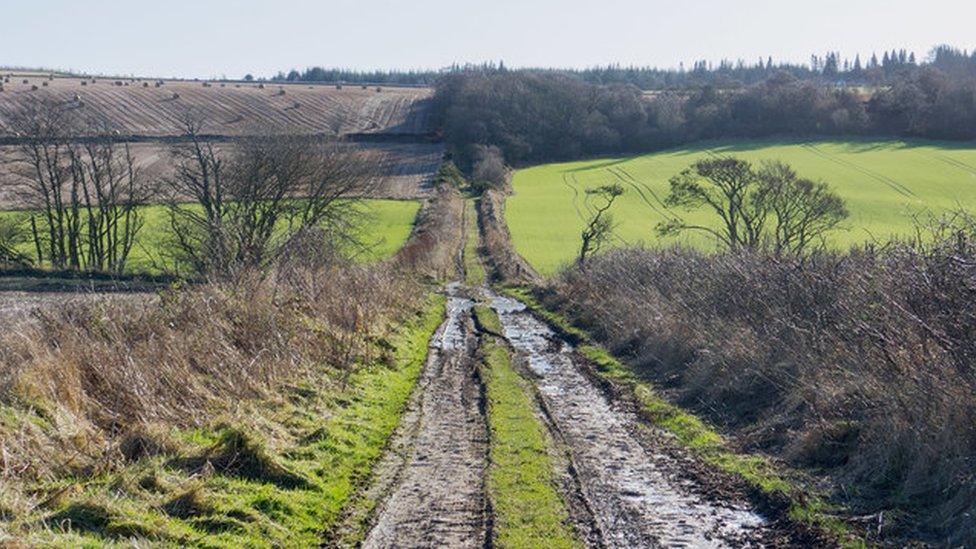'Abuse of power' over Scottish land ownership
- Published
- comments

Large concentrations of land ownership are leading to power being abused in some parts of Scotland, according to a report by the Scottish Land Commission.
Its investigation said a "land monopoly" in effect existed in many areas.
The report also said the law provided very little protection.
Scottish Land and Estates, which represents land owners, said the report did not adequately reflect the contribution made by rural businesses.
The commission's report calls for a public interest test for future land sales.
'Irresponsible exercise of power'
More than 400 people gave evidence to the investigation, including land owners, land managers and community representatives and individuals.
The report found that most of the disadvantages from Scotland's current pattern of land ownership related to a concentration of decision-making power.
It said that in some parts, that hampered economic development and caused serious and long-term harm to communities.
It added that there was an "urgent need" for mechanisms to protect fragile communities from the "irresponsible exercise of power".

The commission's chief executive officer Hamish Trench said: "Concern about the impacts of concentrated land ownership in Scotland has long been central to the land reform debate.
"This evidence report allows us to move on from debating whether ownership is an issue, to understanding what the issues are and how they can be addressed.
"The evidence we have collected shows clearly that it is the concentration of power associated with land ownership, rather than necessarily the scale of landholding, that has a significant impact on the public interest, for example in relation to economic opportunities, housing and community development."
He added: "Good management can of course reduce the risks associated with the concentration of power and decision-making, but the evidence shows that adverse impacts are causing significant detriment to the communities affected.
"This points to the need for systemic change beyond simply a focus on good management."
The commission makes a series of recommendations including:
A public interest test for significant land transfers
The requirement for a land management plan for estates
A statutory land rights and responsibilities review.
The report and recommendations will now be considered by ministers.
Sarah-Jane Laing, chief executive of Scottish Land and Estates, said: "We are deeply concerned that the report still sees land ownership rather than land use as the prime route to dealing with issues being faced by communities. Nor does the report adequately reflect the positive and substantial contribution made by rural businesses.
"We also want to see more detailed and compelling examples to support the report's claim that concentrated landownership is damaging fragile communities.
"The stereotypical view of landowners held by some simply do not reflect current day reality."
'Socially corrosive'
She added: "Landowners generally operate as modern businesses involved in a range of sectors such as agriculture, forestry, energy, leisure and tourism and pursuing innovation, economic prosperity and employment opportunities.
"For example, more than 9,000 rural homes are let by private land-based businesses and Scotland's three new towns are being developed by rural landowners."
The report describes abuse of power in rural communities as a result of individual behaviour and suggests that policy focus should be on changing those behaviours.
But it adds that the system in which they operate is ultimately responsible for their ability to misuse their power.
It said the "socially corrosive" effects of land monopoly occurred because of what a landowner "could" do rather than what they had actually done.
But it said abuse was just as likely to come from public or community land owners as private ones.
'Cruel contrast'
Community Land Scotland welcomed the commission's recommendations and described monopoly landowner power as "an affront to a modern, democratic and socially progressive Scotland".
The organisation's policy director Dr Calum MacLeod said it was in "cruel contrast" to communities who now manage almost 600,000 acres in the interests of local residents.
He said: "Places like Eigg, Knoydart, Gigha, North and West Harris, first and foremost, pursued a community buyout to stem the tide of depopulation, and by and large they have succeeded.
"But, as things stand, not every community has the opportunity to acquire their local land."
A spokesman for the Scottish government said: "We welcome the SLC's report and will be working closely with the commission and stakeholders to consider the recommendations in the coming months.
"We expect that the report will inform how we address long-standing issues caused by the concentration of land power in rural Scotland, to the benefit of local communities."
- Published23 March 2018

- Published28 September 2017

- Published3 April 2017

- Published14 October 2016
